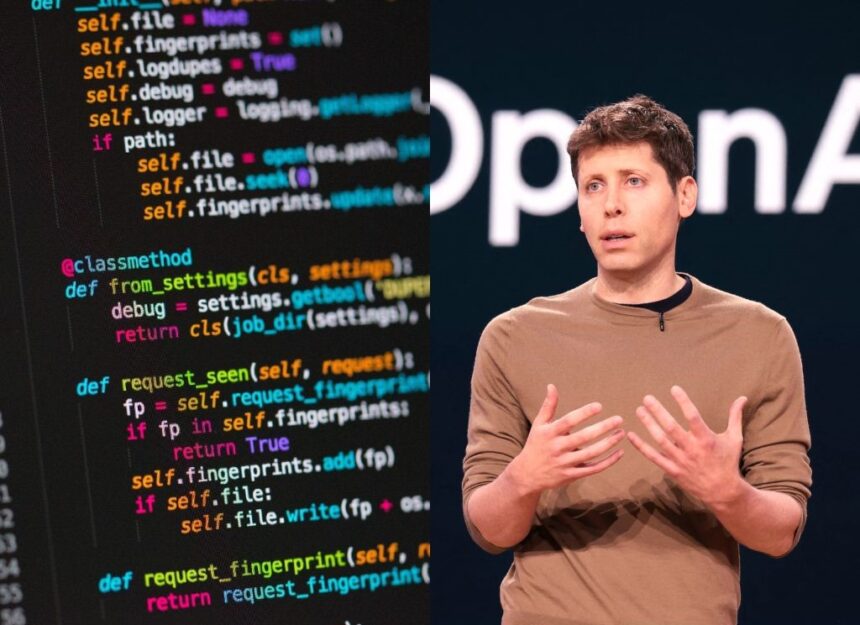To no one’s surprise, artificial intelligence is advancing at a dizzying pace and is increasingly impacting professions, especially in the technology sector. If until now your best bet for a career was learning programming languages like Java, Rust, Python, C, or JavaScript, you may want to reconsider.
Sam Altman, CEO of OpenAI and creator of ChatGPT, warns that AI tools will soon surpass the skills of programmers, that would radically transform the concerned job sector within some years to come.
In an interview with Ben Thompson published in Stratechery, Altman did not hesitate to point out on what a vast scale AI-powered platforms are revolutionising the tech industry.
In fact, the executive assured, according to Business Insider, that soon, these systems will be able to generate code more efficiently and accurately than any human, gradually replacing tasks that until now have been the exclusive responsibility of computer engineers.
In this way, he offered clear and forceful advice to students: mastering AI will be as crucial in the near future as learning to program was decades ago. Therefore, it’s important to adapt quickly to this change.
The future is AI: Are you ready?
For Altman, the secret to facing an increasingly automated labor market is to develop “resilience and adaptability,” two fundamental skills that will allow you to constantly reinvent yourself in the face of technological change.
It’s not just about acquiring specific knowledge, but about perfecting the “metaskill of learning” —the ability to quickly assimilate new concepts and technologies as they evolve.
This means you shouldn’t focus exclusively on specific languages or tools, but rather on the ability to adapt to changing market circumstances.
Altman suggests that you should get used to maintaining an open attitude toward constant innovation, especially since the speed at which technological changes are being introduced will increase exponentially in the coming years.
Although software engineers remain in high demand, he points out that this reality will not continue indefinitely.
In fact, as AI improves, these AI-powered models will progressively automate much of the programming work , reducing the need for these professionals in the near future. According to Altman, this transition won’t happen abruptly, but rather steadily and increasingly rapidly.
Gradual, but inevitable, automation
The OpenAI CEO emphasises that the AI-powered automation process will be gradual at first, slowly advancing on specific tasks, before rapidly accelerating over a short period of time.
According to Altman, technology hasn’t yet reached that critical point, but it’s closer than you think. When asked what’s left for that to happen, he responded emphatically: “We just need a little more time.” With this statement, he somewhat seals the future of programmers specializing in languages like Python, C, or JavaScript.
Although these languages are essential today and offer good job opportunities, in a few years they could lose relevance in the face of automated systems capable of writing code much more quickly and accurately. This could cause traditional programming skills to no longer be as valuable as they are today.
In the end, you should not take Altman’s warning as a wake-up call, but also an opportunity. If you want to be prepared for this new scenario, it is essential to “learn to coexist with artificial intelligence”, master its tools, and, above all, develop the constant ability to adapt to the technological change that is coming.
Sam Altman recognises one of ChatGPT’s major shortcomings

When you use ChatGPT, you’ll likely find that the conversation flows naturally and offers coherent responses. However, this hasn’t always been the case. Sam Altman, the founder of this popular platform, has publicly acknowledged what was long the biggest weakness of his flagship chatbot: its user experience.
According to him, in the early days, his tool had a major problem with the way it communicated: it didn’t know how to really treat people. The artificial intelligence was overly cautious, overly neutral, and avoided certain topics that were sometimes precisely the most interesting to users.
Altman admitted in a recent interview that they were “really bad at it.” This aspect became especially evident with the arrival of Grok, another chatbot that stood out for interacting with people in a more direct, adult, and casual manner. This made it clear that ChatGPT needed to change quickly to keep up.
Now, after learning from those initial mistakes, the CEO says that OpenAI has improved considerably in this regard, working to give ChatGPT a more open and mature conversational style.
In this way, it recognises that this evolution has been key to keeping users interested and satisfied, thereby overcoming the weakness that once jeopardized the reputation of its tool, which today is one of the most popular and widely used programs in the world.





